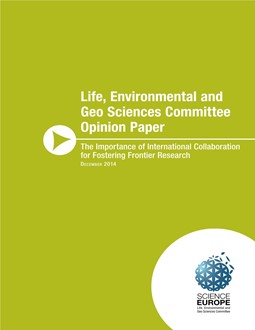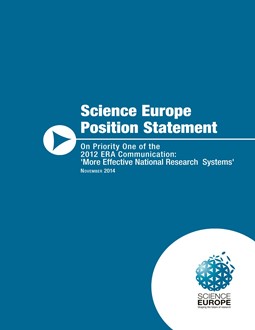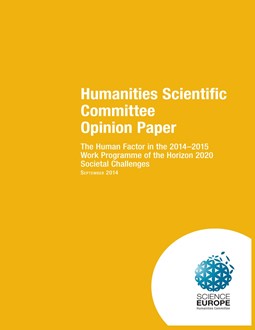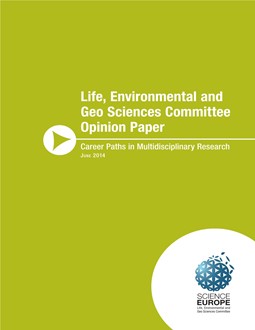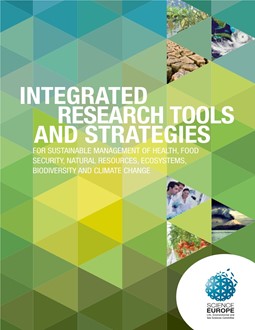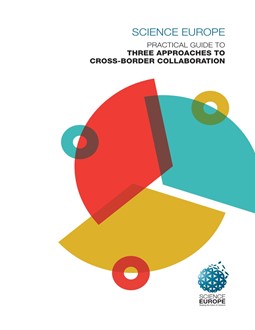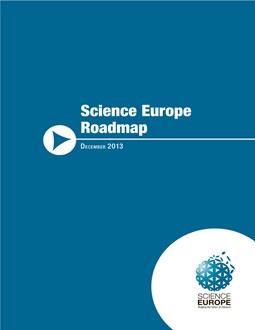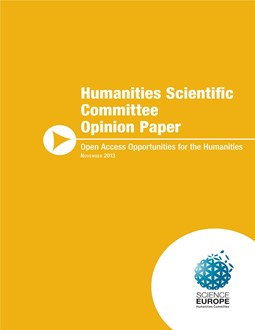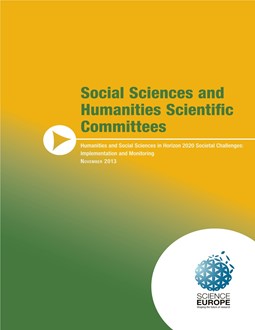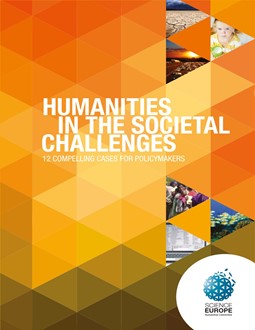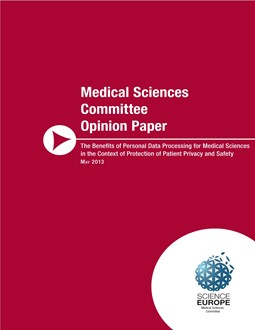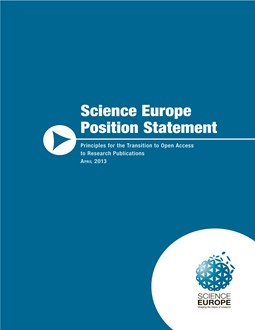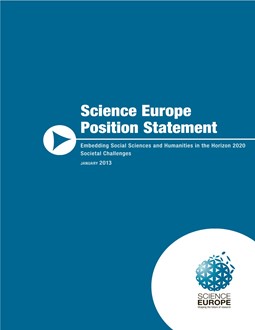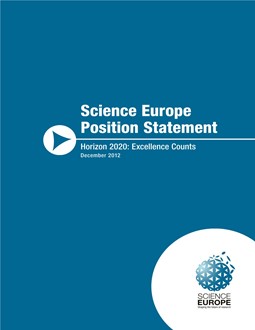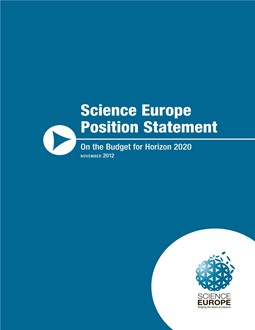Member-only content is available on this page. Please log in to view this content.

What's going on?
516 item(s) found
The Importance of International Collaboration for Fostering Frontier Research
In this paper produced by the Scientific Committee for the Life, Environmental and Geo Sciences, the Committee argues that in order to strengthen international collaborative research, the national research funding organisations should consider increasing their efforts to widen the participation of various European countries and global partners in multilateral schemes, whilst fostering interdisciplinarity and knowledge integration. Moreover, a bottom-up approach should be adopted in order to collect research proposals that contain novel ideas and solutions, captured directly from the research community and users, thus enabling open innovation.
Position Statement on Priority One of the 2012 ERA Communication: 'More Effective National Research Systems'
The 2012 Communication ‘A Reinforced European Research Area Partnership for Excellence and Growth’ laid out the current approach for realising a European Research Area (ERA). As this approach is now being reviewed by the European institutions, Science Europe puts forward its analysis of Priority One of the Communication, in order to start a fruitful dialogue with the European institutions on the future of ERA policy. This analysis provides a practical example as to why the current ERA Communication approach needs to be thoroughly reviewed if ERA policy is to have a real impact.
Opinion Paper on the Human Factor in the 2014–2015 Work Programme of the Horizon 2020 Societal Challenges
Since its inauguration in early 2013, the Science Europe Scientific Committee for the Humanities has strongly supported Horizon 2020’s third pillar, Societal Challenges. The Committee realises the importance of the issues addressed, and the urgent need to find solutions to these pressing questions. The Committee is therefore committed to making the Challenges-approach successful.
Career Paths in Multidisciplinary Research
In this paper, produced by the Scientific Committee for the Life, Environmental and Geo Sciences, the Committee highlights the lack of clear evaluation metrics for scientists working in multidisciplinary teams. The Committee devises also concrete recommendations to contribute to the elaboration of an appropriate evaluation framework and suggests four main categories of indicators that demonstrate success in multidisciplinary and collaborative research: data generation, analysis and knowledge management; the development of enabling tools for data handling; the added value of collaborative research, and acknowledging contributions in bibliometic analysis.
Integrated Research Tools and Strategies for Sustainable Management of Health, Food, Security, Natural Resources, Ecosystems, Biodiversity and Climate Change
Improving the world’s resilience to future impacts of global environmental change is of utmost importance. This brochure outlines strategies on different areas such as health, food, security, and biodiversity and underlines the importance of conserving the planet’s natural resources while adapting to various effects of climate change.
Practical Guide to Three Approaches to Cross-border Collaboration
In a globalised research ecosystem, collaboration is key. This collaboration also brings challenges linked to the diversity of scientific and legal environments. The aim of this practical guide is to provide better and more efficient means for research organisations to apply a set of optional models for cross-border collaboration and to help them achieve more successful and easier implementation.
Science Europe Roadmap
The Roadmap, approved by the Science Europe General Assembly in November 2013, is Science Europe’s action plan to contribute to the elements of a successful research system. It acts as a framework for voluntary collective activity, providing a long-term strategy for the association. The ‘Priority Action Areas’ are those in which Science Europe members believe that there is a potential to achieve tangible and substantive progress, and where they can add real value by working together.
Open Access Opportunities for the Humanities
Published on the occasion of the tenth anniversary of the Berlin Declaration, this paper encourages the humanities research community to engage with the new possibilities that Open Access can offer. It also calls on research funding and performing organisations to work together to tackle the specificities and remaining potential obstacles.
Humanities and Social Sciences in Horizon 2020 Societal Challenges: Implementation and Monitoring
This Opinion Paper has been produced by Science Europe Scientific Committees for the Humanities and the Social Sciences to outline the main prerequisites for the successful integration of Social Sciences and Humanities throughout Horizon 2020’s Societal Challenges and across the entire research ‘ecology’. Overall, these elements should ensure a coherent interplay between the high-level objectives of Horizon 2020, the programme design, its implementation and evaluation.
Humanities in the Societal Challenges – 12 Compelling Cases for Policymakers
This is the first brochure produced by the Science Europe Scientific Committee for the Humanities, with the objective to increase awareness of how the humanities are actually contributing to the Societal Challenges. The humanities have important resources to offer and it is essential that in the formulation of the Horizon 2020 programme texts there is scope to include these valuable lines of research. The projects highlighted in the brochure not only have made a concrete, societal impact but also break through the usual stereotypes of the humanities and therefore widened the view on our field.
The Benefits of Personal Data Processing for Medical Sciences in the Context of Protection of Patient Privacy and Safety
This paper expresses the concerns of the medical and health research communities about the lack of a specific consideration when regulating the privacy of individuals and protecting personal data in the context of medical and health research in the General Data Protection Regulation.
Position Statement on the Proposed European General Data Protection Regulation
The European Institutions are currently entering the crucial stage of the legislative process that will revise the EU Data Protection Directive and lead to the European General Data Protection Regulation (DPR). Scientific research produces high impact results, depending heavily on access to and use of datasets that include personal data. In order to continue to perform scientific research for the benefit of Europe and its citizens, researchers need an appropriate DPR that reconciles the safe processing of personal data for scientific research and the protection of individual rights to privacy
Principles for the Transition to Open Access to Research Publications
Science Europe Member Organisations are committed to ensuring that publicly-funded research and innovation in Europe has the maximum impact, leading to new discoveries, and providing solutions that deliver societal benefit. Research publications are one of the main results of the research process and the Research Performing and Research Funding Organisations that comprise Science Europe share the vision of increasing the impact and reducing the costs of research publications by moving to a system of Open Access.
Embedding Social Sciences and Humanities in the Horizon 2020 Societal Challenges
European social sciences and humanities research is world leading in many areas. SSH research perspectives are key to tackling grand societal challenges in the future and its role throughout H2020 needs to be substantial. Simply stating such an ambition will not, however, result in its achievement. Here we provide some practical recommendations for how SSH can be embedded into the societal challenges in a meaningful and constructive way.
Horizon 2020: Excellence Counts
Producing excellent science and research has historically been Europe’s key asset for sustainable growth and maintenance of a leading position in a highly competitive global economy. Horizon 2020, the European Framework for Research and Innovation from 2014 to 2020, complements national and cross-border efforts and should strengthen the impact of investments into science, research and innovation.
Horizon 2020 Budget: Time for Europe to Commit to a Knowledge-based Economy
As European leaders meet to decide on the budget of the EU for the next seven years, the 50 major Research Performing and Research Funding Organisations that constitute Science Europe would like to stress the importance of adequate funding for research and innovation at the European level. The Europe 2020 strategy is the primary EU-level plan to strengthen growth and competitiveness, by producing clear European added value through investment in education, research and innovation.

